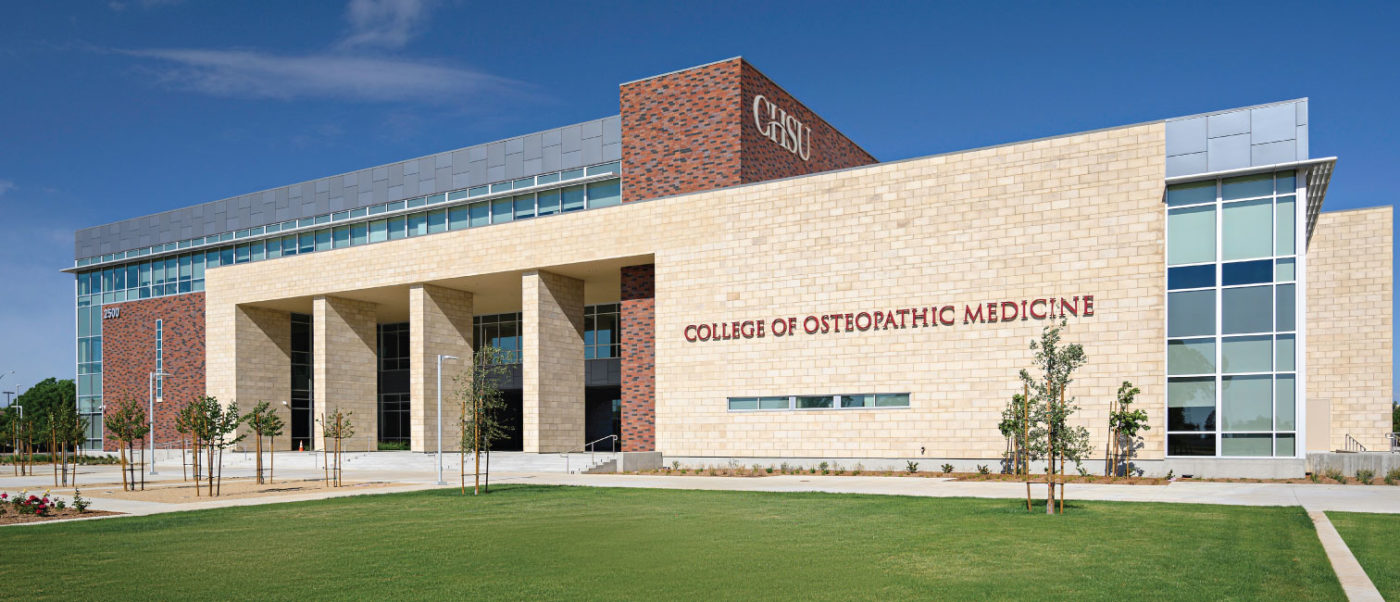Even though California Northstate University College of Medicine is a relatively new medical school, it’s already making a name for itself. Founded in 2015, CNUCOM has a 98.9% Match rate and offers 141 courses. CNUCOM’s mission is “to advance the art and science of medicine through education, service, scholarship and social accountability.”
With excellent core values and an outstanding Doctor of Medicine program, California Northstate University College of Medicine has much to offer prospective students. CNU believes in excellence, professionalism, ethics, compassion, social accountability and innovation. CNUCOM believes in the success of the next generation of doctors.
In today’s article, we’ll cover everything you need to know about California Northstate University College of Medicine, including:
- Programs Offered
- Required Prerequisites
- Cost of Attendance
- Class Statistics
- Primary and Secondary Applications
- Essay Questions (with Samples)
- Interview Prep
- How IMA Can Help
Without further ado, let’s dive in!
Programs Offered
California Northstate University College of Medicine offers students the traditional, four-year Doctor of Medicine degree. While California Northstate University also houses healthcare administration and pharmaceutical degrees, these aren’t offered in conjunction with a medical degree. This is understandable since the college is only five years old and is still going through the accreditation process.
In this section, we’ll review the program learning objectives and phased curriculum for the Doctor of Medicine program.
Program Learning Objectives
- Patient Care
- Medical and Scientific Knowledge
- Communication and Interpersonal Skills
- Professionalism
- Health Care Systems
- Reflective Practice and Personal Development
Phase A
The Doctor of Medicine program is split into phases. Phase A combines Years 1 and 2 into “systems-based courses.”
Year One
- Foundations of Clinical Medicine
- Hematology
- Integumentary and Musculoskeletal Systems
- Neuroscience
- Cardiovascular and Pulmonary Systems
Year Two
- Endocrine System
- Gastrointestinal System
- Renal System
- Reproductive Systems
- Stages of Life
- Behavioral Medicine
Throughout Phase A, you’ll also participate in Medical Skills, the Master Colloquium, and a self-directed Student Scholarly Project Course.
Medical Skills
- Study materials before class
- Body painting surface anatomy sessions
- Hands-on demonstrations
- Paired or standardized patient practice sessions
- Simulated clinical procedures
- Problem solving exercises in a team setting
- Small group training using partial task simulators
- Real-life interactions with patients who need treatment
- Experiential education on relevant topics in nutrition
- Journal club
Masters Colloquium
The Masters Colloquium is unique to California Northstate University College of Medicine. Every medical student in your incoming class will be divided into groups of 20, with each group constituting its own “college.” Each college will go through the following topics during Year 1:
- Introduction to Masters Colloquium, Ice Breaker and Professionalism
- Myers Briggs assessment, Purpose in career, Time Management and Teamwork
- Self-Care
- Service Learning
- Chronic Disease Panel
- Fundamental Ethical Principles I
- Communication Skills I
- Introduction to Global and Public Health
- Problem Solving in Public Health
- Patient Care Experience
- Fundamental Ethical Principles II
- Communication Skills II
- Program Planning for Health Behavior Change
- Fundamental Ethical Principles III
- Introduction to US Health Care I
- Placebo – Power of Language
- Introduction to US Healthcare II
- Communications Skills II
- Advances in Community Orientated Primary Care
- California Tobacco Program
- Health Care Disparities
- Health Literacy and Check-in
You’ll go through the following topics for Year 2:
- Burnout
- Major Global Infectious Disease
- Public Health Biology
- Doctor as Patient
- Providing Culturally Competent Care
- Environmental Health
- Communication IV
- Managing Health Service Organization
- Health Care Team and Nurse Perspective
- Quality Improvement
- Fundamental Ethical Principles IV
- Preventing Infant Mortality
- Fundamental Ethical Principles V
- Nutrition Programs/Policy/Politics in US Maternal Child Care
- Integrative Medicine
- Fundamental Ethical Principles VI
- Decision Making Capacity / Informed Consent
- Eradication of Disease through Global Immunization
- Communication V
- Foundations of Leadership and Strategic Planning
- Aging Experience
Scholarly Project
You’ll work in groups of three for your scholarly project. As a group, you’ll work to develop a hypothesis, construct questions, create forms of answering those questions and work with a mentor to research your project. Projects can be in one of the following categories:
- Translational Research
- Clinical Research
- Basic Research
- Global Health
- Medical Education
- Epidemiology
- Public and Environmental Health
- History of Medicine
You’re welcome to choose a more niche topic within one of these subjects.
Phase B
Phase B consists of your clinical clerkships. These begin after you’ve taken USMLE Step 1. The clerkship curriculum takes 46 weeks to complete, so you’ll spend the better part of a year completing these clerkships. Phase B is your opportunity to apply what you’ve learned in the classroom to real-life settings.
- Family Medicine (6 weeks)
– Sexual dysfunction
– Back pain
– Cough /URI / viral syndrome
– Depression/anxiety
– Diabetes and associated complications
– Dyslipidemia
– Dysuria / hematuria / stones / UTI
– Hypertension
– Allergy/sinus problems
– Musculoskeletal complaint
– Preventive care / health promotion / counseling
– Skin problems
– Scrotal mass/pain
– Thyroid disfunction
– Women’s health wellness
*Students must also learn the following procedures: breast examination, glucose finger stick, IM injection, PPD placement and urine dipstick with interpretation
- Internal Medicine (8 weeks)
– Acute MI
– Altered mental status
– Anemia
– Back pain
– Congestive heart failure
– Cancers
– Cough
– COPD / asthma
– CVA
– Depression
– Diabetes mellitus
– DVT
– Scrotal mass/pain
– Dyslipidemia
– Dyspnea
– Dysuria / UTI
– Fever
– Fluids, electrolytes
– GI bleed
– HIV
– HTN
– Joint pain
– Liver disease
– Nosocomial infections
– Obesity
– Osteoporosis
– Pneumonia
– Preventative care
– Rash
– Renal failure
– Rheumatologic problems
– Smoking cessation
– Substance abuse
– Thyroid/parathyroid
– Weight loss
– Sexual dysfunction
* Students must also learn the following procedures: airway management, CPR/ET tube placement, arterial blood gas, EKG placement and interpretation, abdominal ultrasound, foley catheter placement, nasogastric tube placement, peripheral IV placement, rectal exam and venipuncture.
- Neurology (4 weeks)
– Alcohol/substance abuse
– Altered mental status/coma
– Chronic pain
– Dizziness / syncope
– Headache
– Movement disorder / Parkinson’s disease
– Multiple Sclerosis
– Nervous system tumors
– Neuropathy
– Neuropharmacology
– Seizure / epilepsy
– Stroke
* Students must learn how to perform a lumbar puncture.
- Obstetrics / Gynecology (6 weeks)
– Sexual dysfunction
– LGBTQ awareness (training to be sensitive)
– Abnormal PAP smear
– Breast pain / mass / nipple discharge
– C-section
– Contraception / reproductive options
– Infertility
– Domestic violence / sexual abuse
– Labor / delivery
– GU malignancy
– Hysterectomy
– Menopause
– Menstrual abnormalities / abnormal genital tract bleeding
– Puerperium
– Pelvic mass
– Pelvic pain
– Pregnancy
– Hypertension
– Pregnancy
– Pregnancy loss
– STD (including screenings)
– Vaginal discharge
– Infant delivery
*Students must learn the following procedures: breast exam, mammogram, abdominal or vaginal ultrasound, infant delivery, cervix biopsy, pap smear and pelvic exam.
- Pediatrics (4 weeks)
– Abdominal pain
– Asthma
– Behavioral
– Chronic medical conditions
– Central nervous system
– Child abuse
– Dermatologic conditions
– Jaundice
– Lower respiratory conditions
– Nutrition
– Well-child care
* All the topics included in internal medicine apply to pediatrics.
- Psychiatric
– Alcohol/substance abuse
– Altered mental status/coma
– Anxiety conditions
– Bipolar disorder
– Chronic pain
– Depression
– Delirium / dementia
– Headache
– Personality disorder
– Suicidal ideation / attempt
– Psychosis or schizophrenia spectrum disorders
- Surgery (8 weeks)
– Inguinal / abdominal hernia repair
– Anorectal procedures
– Laparoscopic procedures
– Laparotomy
– Incision and drainage
– Wound care
*Students must learn the following procedures: skin suturing.
- Emergency Medicine (4 weeks)
– Abdominal pain
– Acute febrile illness/sepsis
– Altered mental status
– Asthma
– Chest pain
– Complications of Alcoholism
– Dyspnea
– Headache
– Scrotal mass/pain
– Overdoses
– OB/GYN emergency
– Orthopedic injuries
– Palpitations
– Pediatric emergencies
– Psychiatric emergencies
– Trauma (major)
– Trauma (minor)
Northstate Medical School is affiliated with the following hospitals for clerkships:
- Kaiser Permanente of Northern California
- Dignity Health System
- Heritage Oaks (Psychiatric Hospital)
- Sierra Vista (Psychiatric Hospital)
Phase C
Phase C is the final phase and consists of your electives. You can choose from the following list to meet the elective credit hour requirements:
- Allergy & Immunology
- Anesthesia
- Dermatology
- Emergency Medicine
- Family Medicine
- Internal Medicine
- Cardiology
- Endocrinology
- Gastroenterology
- Hematology & Oncology
- Infectious Disease
- Palliative Medicine
- Pulmonary
- Renal
- Rheumatology
- Sports Medicine
- Neurology
- Neurosurgery
- OB/GYN
- Ophthalmology
- Orthopedic Surgery
- Otolaryngology
- Physical Medicine & Rehabilitation
- Pediatrics
- Pathology
- Plastic Surgery
- Psychiatry
- Radiology
- Surgery
- Urology
As you can see, the Doctor of Medicine program is comprehensive. It covers everything you’ll need to know to become a successful doctor. After completing the medical school curriculum, you’ll take USMLE Step 2 CK. Then, you’ll begin residency.
Do you want to attend CNU College of Medicine? Keep reading to find out how to get in.
Required Prerequisite Courses
To be considered for admission to Northstate Medical School, you’ll need to take the following prerequisites.
- College-level English (2 semesters)
- Biology with Lab (2 semesters)
- Inorganic Chemistry with Lab (2 semesters)
- Organic Chemistry with Lab (2 semesters)
- Physics (2 semesters)
- College-level Math (2 semesters)
- Biochemistry (1 semester)
The following courses are recommended but not required:
- Social sciences
- Behavioral sciences
- Foreign languages
- Anatomy
- Physiology
- Microbiology
- Immunology
To be competitive, students should have a 3.4/4.0 GPA and a 508 MCAT score. Students must have a 2.8/4.0 GPA and a 497 MCAT score to be considered for admission. Northstate Medical School accepts MCAT scores from the last three years.
Cost of Attendance
So, how much does it cost to attend CNU College of Medicine? There’s the cost of tuition and then the total cost of attendance. What’s the difference? The cost of attendance includes all of your living expenses, like food, housing and transportation.
Tuition for Each Year
Year 1: $65,780
Year 2: $69,068
Year 3: $72,522
Year 4: $76,148
Other Costs
For the following list, prices are listed for each year after the slash mark.
- Student Association / Support Fee: $500 / $500 / $500 / $500
- Student Disability / Liability Coverage Fee: $91 / $91 / $91 / $91
- Technology Fee: $100 / $100 / $100 / $100
- Scholarly Research Projects Fee: $125 / $125 / $0 / $0
- Medical Lab Fee (Anatomy, Medical Skills, and Research): $500 / $500 / $0 / $0
- USMLE Step 1 Preparation Package: $239 / $239 / $0 / $0
- Orientation Fee: $75
- CPR Fee: $80 / $0 / $80 / $0
- Medicine Kit Fee1: $105
- Kaplan Preparation Package: $0 / $725 / $0 /$0
- Student Tuition Recovery Fund Fee: $145.50
- Enrollment Agreement Fee: $100
- CBSE Exams x2 Fee $0 / $114 / $0 / $0
- UWorld Programs Fee: $0 / $429 / $0 / $0
- CCSE Exam x1 Fee: $0 / $0 / $57 / $0
- Online MedEd Package: $300 / $300 / $300 / $0
- Background Check Fee: $0 / $0 / $75 / $0
- Clerkship (Bootcamp) Orientation Fee: $0 / $0 / $40 / $0
- Graduation Fee: $300
Total Estimated Tuition & Fees per Year
– Year 1: $68,140.50
– Year 2: $72,191
– Year 3: $73,765
– Year 4: $77,139
= $291,235.50
You’ll also pay $3,345 per year for your health insurance premium. Other fees are estimated based on costs from past years.
Class Statistics
For the class of 2024, the stats are as follows:
- 4,489 applications received
- 257 candidates interviewed
- 96 in-state students
- 5 out-of-state residents
- 61 male students
- 40 female students
- 57% Asian students
- 3% Hispanic, Latino or of Spanish origin
- 22% White
- 3% two or more races
- 15% declined to give their ethnicity
- 512 average MCAT score
- 3.7 total average GPA
Primary and Secondary Applications
You’ve learned about the Doctor of Medicine program. You’ve seen how much it costs and what the demographics are like. If you want to apply to the Doctor of Medicine program, you’ll need to submit two applications: your primary and your secondary.
You’ll submit your primary application via the American Medical College Application Service. CNUCOM will review your application. If they want to get to know you better, they’ll invite you to fill out their secondary application. This application is comprised of essay questions to help the admissions committee get to know you better. After your secondary application has been reviewed, they’ll decide whether to invite you to an interview.
Essay Questions (with Samples)
There are eight total essay questions. You have 250 words for each of your responses.
Question #1
Please explain why you’re applying to CNUCOM.
Do you have a specific reason for why you want to attend CNUCOM? If so, the admissions committee wants to know why.
Here’s an example:
I want to attend CNUCOM because of the Doctor of Medicine program. When I was researching CNUCOM, I really liked what I saw in the curriculum. I believe the Medical Skills and Masters Colloquium would enhance my experience as a student and better enable me to serve the Sacramento area as a doctor. Additionally, I appreciate the phased approach that CNUCOM uses for the Doctor of Medicine curriculum. I feel like my education at CNUCOM would be rewarding and fulfilling.
Question #2
During your time both as a medical student and a doctor, you’ll spend time with students, faculty, colleagues and patients who are from different places. They’ll have unique cultural backgrounds and different socioeconomic statuses. Tell us about your experiences with diverse populations. How have those experiences prepared you to attend medical school in Elk Grove, California? Are you prepared to practice medicine in Sacramento and the Central Valley?
This question is classic but important! California is home to many immigrants. Everyone needs to feel comfortable going to the doctor, so your ability to communicate and connect with people from all walks of life is very important. We recommend drawing from your experiences and relating them to the medical field.
Question #3
If you had a pre-health advisor during your undergraduate studies, please share your experience. If you navigated medical school applications on your own, please share that experience instead.
Here’s an example:
I tried to meet with my pre-health advisor, but his schedule was booked three months out. By the time he called me, I was in the middle of studying for finals. I tried again the next semester but dealt with the same scenario again. Luckily for me, I had another plan.
You see, I’ve known I want to become a doctor since high school, and I’d already looked into a few medical schools. I live in Sacramento and want to live with my parents to cut down on living expenses. When I saw that Sacramento was getting a new medical school (CNUCOM), I was immediately interested. I looked at all the required prerequisites and made sure to take those classes. I carefully followed the admissions process listed on each medical school website.
Don’t get me wrong. The medical schools that have been around for decades have a lot to offer. But a new school with an approach like CNUCOM’s intrigues me. After researching everything that CNUCOM offers, I knew this was one of the schools to which I’d be applying. So, while I never met with my pre-health advisor, I felt adequately prepared to apply to medical school.
Question #4
“In which direction would you like to see healthcare progress over the next decade?”
Here’s an example:
In the next decade, I would like to see access to healthcare progress. Medical tools and technologies are constantly evolving, and this is great. But not everyone has access to healthcare. Health insurance is expensive, and not everyone qualifies for it through their employment. Those who do can’t always afford their copays.
We live in a “gig economy,” where many people work multiple part-time jobs to make ends meet. Getting healthcare became easier with the healthcare marketplace, but not everyone can qualify for a discount. Healthcare can cost hundreds of dollars a month.
It’s no wonder that not everyone goes to the doctor for preventative care. What’s even worse is that many people forgo the doctor altogether, even when they’re sick. So, in the next 10 years, I’d really like to see healthcare become more available to everyone.
Question #5
Please explain any gaps in your education.
This question is only applicable if you have gaps in your education. If you don’t, simply state that it’s not applicable. If you do have gaps in your education, we recommend focusing on why it was unavoidable or necessary. Examples include financial or economic hardship, unexpected tragedy or death in the family or long-term illness. If you don’t have a reason like this for your gap, then be honest and explain what happened. The admissions committee will respect you for being honest.
Question #6
“If you have previously applied to medical school, what have you accomplished since that time that would warrant your admission now?”
We interviewed Mekinzee Elliott (who was then a second-year medical student) about her experience getting into medical school. She was rejected the first time she applied to medical school. Mekinzee is now going through her core clinical rotations in her third year.
It’s not the end of the world if you’re applying to medical school for the second time. In fact, the AMCAS application asks you if you’re applying for the first time. This suggests that there are many applicants attempting to get in for the second time.
Question #7
“Is there anything you would like the Admissions Committee to know that is not reflected elsewhere in your application?”
This question is great because it’s so open-ended that you can discuss just about anything. Maybe you’d like to share an internship experience that impacted your desire to become a doctor. Perhaps you had to take a class twice because you didn’t do so well the first time. But what might have been a negative experience turned into an amazing one because of the professor who taught the class when you re-took it. There are quite a few angles from which you can approach this question.
Question #8
How do you feel about standardized tests? Please share with us how you prepared for the MCAT. Include what tools and resources you used to study. Do you believe that your score is a reflection of your future performance in medical school? Do you believe that your preparation for the MCAT will help you when it’s time to take USMLE Step 1 and Step 2 CK?
Standardized tests are a critical part of becoming a doctor. If you don’t do well with standardized tests, you will really struggle to get through medical school. Exams are at every turn.
Here’s an example:
I work really well with a structured approach, so I used study guides to help prepare for the MCAT. But while that helped, I didn’t have a very good experience. The testing environment was very distracting. An asthmatic individual was seated next to me and kept lowering his mask to take a puff of his inhaler. I figured the mask was aggravating his symptoms, but we were all required to wear one for the duration of the test. Every time I heard his inhaler click, I would lose my train of thought. He used it often enough that I was scared that I wouldn’t do well, even though I normally do fine with standardized exams. I wanted to score a 512, but I scored a 508. I didn’t think that justified retaking it, especially since a lot of pre-med students were trying to take their MCAT. Testing centers had just re-opened from their COVID shutdowns.
I believe my preparation for the MCAT will lend itself to my preparation for USMLE Step 1 and Step 2 CK because I learned how I learn. I do well with a textbook, a highlighter and noise-canceling headphones. I will use the same methods for studying again. I believe that doing so will lead to success.
Those are all the questions that California Northstate University College of Medicine asks prospective students on the secondary application.
Interview Prep
First of all, congratulations on scoring an interview with California Northstate University College of Medicine! This is a big deal. It’s not easy to get an interview for medical school.
Due to the COVID-19 pandemic, CNUCOM is currently conducting all interviews virtually. The school utilizes the MMI and Dialogue segment interview formats. Need help preparing for your interview? International Medical Aid provides medical school admissions consulting to help you prepare for your interview day. Our consulting includes mock interview prep. We’ll go through what to say and what not to say during your interview. We’ll also provide you with pointers to successfully complete a virtual interview.
How IMA Can Help
Getting into medical school isn’t easy. That’s why International Medical Aid offers medical school admissions consulting. Not only that, but we also offer voluntary healthcare internships abroad. Our voluntary healthcare internships abroad take you to countries in East Africa, South America and the Caribbean. You’ll shadow doctors as they provide healthcare to underserved populations. If you’re looking for experiences that will immerse you in another culture, our voluntary healthcare internships abroad are perfect for you. Reach out to us today to get started.
Conclusion
Applying to medical school is a big deal. We’re thankful that you’re allowing us to be part of your journey. We hope this medical school guide has given you a good sense of whether California Northstate University College of Medicine is the right school for you to attend.
We also want to encourage you to apply to several more schools. Because acceptance rates are so low, it can be hard to get in. Sending in several applications helps increase your chances. You might get accepted into more than one school and get to choose! As part of our efforts to help you get into medical school, we’ve created guides to some of the best schools in the country. Check them out while you’re here.
- Touro University of California
- CHSU College of Osteopathic Medicine
- UC Davis School of Medicine
- Harvard Medical School
- UC Riverside School of Medicine
- USC Keck School of Medicine
- UT Southwestern Medical School
- Long School of Medicine at UT Health San Antonio
- University of the Incarnate Word School of Osteopathic Medicine
- UT Austin’s Dell Medical School
- UTMB School of Medicine
- McGovern Medical School at UT Health
- Johns Hopkins School of Medicine
- McGovern Medical School at UT Health
- The University of Texas Rio Grande Valley School of Medicine
- UNT Texas College of Osteopathic Medicine
- University of Houston College of Medicine
- Texas A&M College of Medicine
- Johns Hopkins Medical School
- Baylor College of Medicine
- George Washington University School of Medicine
- Vanderbilt University School of Medicine
- St. George’s University School of Medicine
- Lake Erie College of Osteopathic Medicine (in Pennsylvania)
- Sidney Kimmel Medical College at Thomas Jefferson University
- Wake Forest University School of Medicine
- Western University of Health Sciences (in California)
- Drexel University College of Medicine
- Stritch School of Medicine at Loyola University Chicago
- Georgetown University School of Medicine
- Yale School of Medicine
- Perelman School of Medicine
- UCLA Medical School
- NYU Medical School
- Washington University School of Medicine
- Brown Medical School
We wish you the very best of luck as you apply to medical school and pursue your dreams. International Medical Aid is here to help you any way we can via our medical school admissions consulting.







